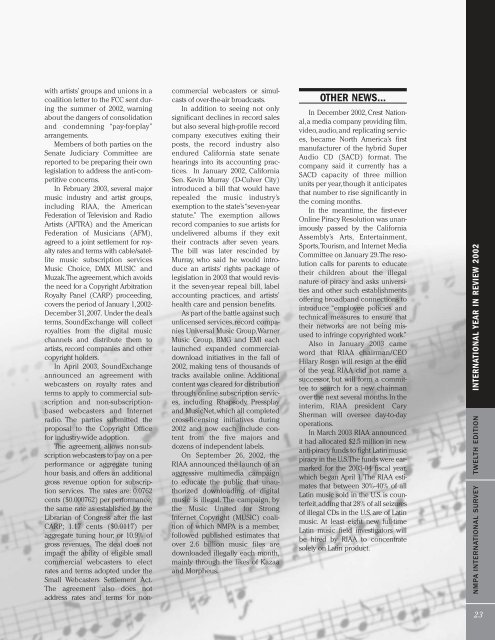NMPA_International_Survey_12th_Edition
NMPA_International_Survey_12th_Edition
NMPA_International_Survey_12th_Edition
Create successful ePaper yourself
Turn your PDF publications into a flip-book with our unique Google optimized e-Paper software.
with artists’ groups and unions in a<br />
coalition letter to the FCC sent during<br />
the summer of 2002, warning<br />
about the dangers of consolidation<br />
and condemning “pay-for-play”<br />
arrangements.<br />
Members of both parties on the<br />
Senate Judiciary Committee are<br />
reported to be preparing their own<br />
legislation to address the anti-competitive<br />
concerns.<br />
In February 2003, several major<br />
music industry and artist groups,<br />
including RIAA, the American<br />
Federation of Television and Radio<br />
Artists (AFTRA) and the American<br />
Federation of Musicians (AFM),<br />
agreed to a joint settlement for royalty<br />
rates and terms with cable/satellite<br />
music subscription services<br />
Music Choice, DMX MUSIC and<br />
Muzak.The agreement,which avoids<br />
the need for a Copyright Arbitration<br />
Royalty Panel (CARP) proceeding,<br />
covers the period of January 1,2002-<br />
December 31,2007. Under the deal’s<br />
terms, SoundExchange will collect<br />
royalties from the digital music<br />
channels and distribute them to<br />
artists, record companies and other<br />
copyright holders.<br />
In April 2003, SoundExchange<br />
announced an agreement with<br />
webcasters on royalty rates and<br />
terms to apply to commercial subscription<br />
and non-subscriptionbased<br />
webcasters and Internet<br />
radio. The parties submitted the<br />
proposal to the Copyright Office<br />
for industry-wide adoption.<br />
The agreement allows non-subscription<br />
webcasters to pay on a perperformance<br />
or aggregate tuning<br />
hour basis, and offers an additional<br />
gross revenue option for subscription<br />
services. The rates are: 0.0762<br />
cents ($0.000762) per performance,<br />
the same rate as established by the<br />
Librarian of Congress after the last<br />
CARP; 1.17 cents ($0.0117) per<br />
aggregate tuning hour; or 10.9% of<br />
gross revenues. The deal does not<br />
impact the ability of eligible small<br />
commercial webcasters to elect<br />
rates and terms adopted under the<br />
Small Webcasters Settlement Act.<br />
The agreement also does not<br />
address rates and terms for noncommercial<br />
webcasters or simulcasts<br />
of over-the-air broadcasts.<br />
In addition to seeing not only<br />
significant declines in record sales<br />
but also several high-profile record<br />
company executives exiting their<br />
posts, the record industry also<br />
endured California state senate<br />
hearings into its accounting practices.<br />
In January 2002, California<br />
Sen. Kevin Murray (D-Culver City)<br />
introduced a bill that would have<br />
repealed the music industry’s<br />
exemption to the state’s “seven-year<br />
statute.” The exemption allows<br />
record companies to sue artists for<br />
undelivered albums if they exit<br />
their contracts after seven years.<br />
The bill was later rescinded by<br />
Murray, who said he would introduce<br />
an artists’ rights package of<br />
legislation in 2003 that would revisit<br />
the seven-year repeal bill, label<br />
accounting practices, and artists’<br />
health care and pension benefits.<br />
As part of the battle against such<br />
unlicensed services,record companies<br />
Universal Music Group,Warner<br />
Music Group, BMG and EMI each<br />
launched expanded commercialdownload<br />
initiatives in the fall of<br />
2002, making tens of thousands of<br />
tracks available online. Additional<br />
content was cleared for distribution<br />
through online subscription services,<br />
including Rhapsody, Pressplay<br />
and MusicNet,which all completed<br />
cross-licensing initiatives during<br />
2002 and now each include content<br />
from the five majors and<br />
dozens of independent labels.<br />
On September 26, 2002, the<br />
RIAA announced the launch of an<br />
aggressive multimedia campaign<br />
to educate the public that unauthorized<br />
downloading of digital<br />
music is illegal. The campaign, by<br />
the Music United for Strong<br />
Internet Copyright (MUSIC) coalition<br />
of which <strong>NMPA</strong> is a member,<br />
followed published estimates that<br />
over 2.6 billion music files are<br />
downloaded illegally each month,<br />
mainly through the likes of Kazaa<br />
and Morpheus.<br />
OTHER NEWS…<br />
In December 2002, Crest National,a<br />
media company providing film,<br />
video,audio,and replicating services,<br />
became North America’s first<br />
manufacturer of the hybrid Super<br />
Audio CD (SACD) format. The<br />
company said it currently has a<br />
SACD capacity of three million<br />
units per year,though it anticipates<br />
that number to rise significantly in<br />
the coming months.<br />
In the meantime, the first-ever<br />
Online Piracy Resolution was unanimously<br />
passed by the California<br />
Assembly’s Arts, Entertainment,<br />
Sports,Tourism, and Internet Media<br />
Committee on January 29.The resolution<br />
calls for parents to educate<br />
their children about the illegal<br />
nature of piracy and asks universities<br />
and other such establishments<br />
offering broadband connections to<br />
introduce “employee policies and<br />
technical measures to ensure that<br />
their networks are not being misused<br />
to infringe copyrighted work.”<br />
Also in January 2003 came<br />
word that RIAA chairman/CEO<br />
Hilary Rosen will resign at the end<br />
of the year. RIAA did not name a<br />
successor, but will form a committee<br />
to search for a new chairman<br />
over the next several months.In the<br />
interim, RIAA president Cary<br />
Sherman will oversee day-to-day<br />
operations.<br />
In March 2003 RIAA announced<br />
it had allocated $2.5 million in new<br />
anti-piracy funds to fight Latin music<br />
piracy in the U.S.The funds were earmarked<br />
for the 2003-04 fiscal year,<br />
which began April 1.The RIAA estimates<br />
that between 30%-40% of all<br />
Latin music sold in the U.S. is counterfeit,adding<br />
that 28% of all seizures<br />
of illegal CDs in the U.S. are of Latin<br />
music. At least eight new full-time<br />
Latin music field investigators will<br />
be hired by RIAA to concentrate<br />
solely on Latin product.<br />
<strong>NMPA</strong> INTERNATIONAL SURVEY TWELTH EDITION INTERNATIONAL YEAR IN REVIEW 2002<br />
23


